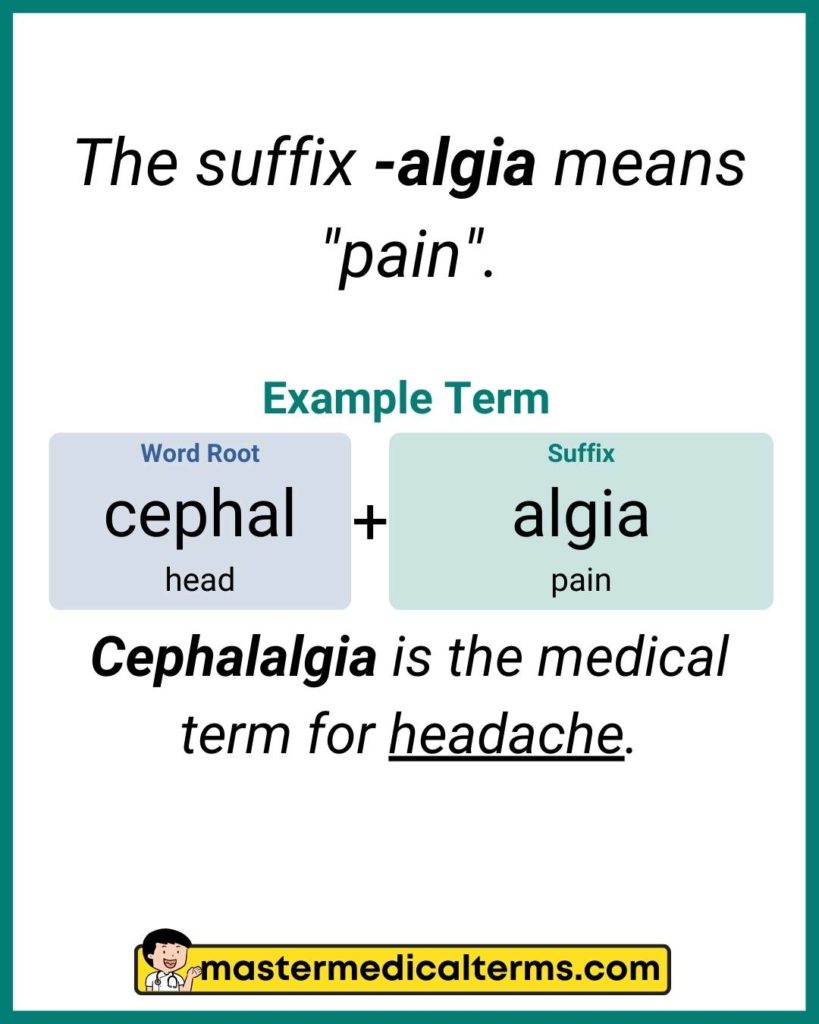The medical suffix term -algia means “pain”.
Example Word: cephal/algia
Word Breakdown: Cephal is a word root that refers to “head”, and -algia refers to “pain”.
Definition: Cephalalgia is the medical term for headache.
More examples of medical terms ending in -algia
Ankylalgia: ankyl/o (meaning “crooked” or “bent”) + –algia (meaning “pain”).
Ankylalgia is a medical condition characterized by pain in a joint or bone that has become stiff or immovable due to abnormal growth or development.
Cephalgia: cephal/o (meaning “head”) + –algia (meaning “pain”).
Cephalgia, or headache, is a common medical condition marked by pain in the head, scalp, or neck. The cause of cephalgia can be tension, illness, or underlying medical conditions, and the severity can range from mild to severe.
Dentalgia: dental (meaning “relating to the teeth”) + –algia (meaning “pain”).
Dentalgia is a medical condition that causes pain in the teeth or surrounding tissues. It may be caused by tooth decay, gum disease, dental abscesses, or tooth injuries, and can range in severity from mild to severe. Treatment for dentalgia may involve dental care, such as fillings, root canals, or extractions, and can also be managed with pain medications.
Fibromyalgia: fibr/o (meaning “fiber”) + my/o (meaning “muscle”) + “-algia” (meaning “pain”).
Fibromyalgia is a medical condition marked by widespread muscle pain, fatigue, and tenderness in specific areas of the body. Other symptoms that may also be present include sleep disturbances, cognitive difficulties, and mood changes. Fibromyalgia can be challenging to diagnose as it does not appear on standard laboratory or imaging tests.
Gastralgia: gastr/o (meaning “stomach”) + –algia (meaning “pain”)
Gastralgia is a medical condition that causes pain in the stomach. It may be caused by indigestion, stomach ulcers, gastritis, or inflammatory bowel disease and can range in severity from mild to severe. Treatment for gastralgia may include medications, dietary changes, or lifestyle modifications, depending on the cause of the pain.
Gynalgia: gyn (meaning “woman”) + –algia (meaning “pain”)
Gynalgia is a medical condition that causes pain in the female reproductive system. It may be caused by menstrual cramps, endometriosis, uterine fibroids, or pelvic inflammatory disease, and can range in severity from mild to severe.
Ischialgia: ischial (meaning “relating to the hip or sitting bones”) + –algia (meaning “pain”).
Ischialgia is a medical condition characterized by pain in the hip or sitting bones.
Lumbalgia: lumb/o (meaning “loin” or “lower back”) + –algia (meaning “pain”).
Lumbalgia is a medical condition characterized by pain in the lower back.
Myalgia: my (meaning “muscle”) + –algia (meaning “pain”).
Myalgia is a condition characterized by muscle pain. It may be caused by overuse, injury, or underlying medical conditions and can range in severity from mild to severe.
Neuralgia: neur (meaning “nerve”) + –algia (meaning “pain”).
Neuralgia is a medical condition that causes severe pain along the course of a nerve. It is often caused by irritation or damage to the nerve and can be treated with medications, nerve blocks, or surgery.




